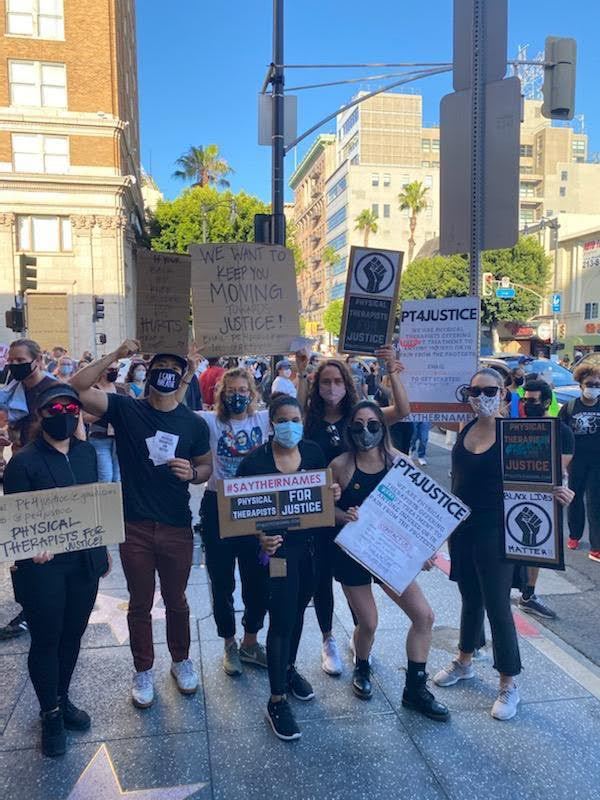Alumni create nonprofit to aid injured BLM protestors

Over the summer, millions of people took to the streets to protest racial injustices and police brutality following the police killing of George Floyd in Minneapolis, putting themselves at risk for physical injury. In response to the protests, a group of recent USC Department of Physical Therapy graduates launched the Movement Network. Formerly known as PT4 Justice, the group aims to provide pro bono physical therapy treatment and education to those injured in the fight for racial equality.
“I think it’s a sign that this is not a moment; it’s a movement,” said Kari Ayoob, a USC alumna who is one of the group’s executive board members. “I think it’s really encouraging to see people not lose momentum and keep up the endurance that it takes to make systemic societal change.”
Ayoob started the organization on social media over the summer by inviting physical therapy graduates from USC to offer services to injured protesters.
“I think all of us get into this profession with the goal to help people and keep people out of hospitals and help people live their lives pain free,” Ayoob said. “We also recognize that this type of medicine is not accessible to everybody, so finding a venue that you can really help these vulnerable populations to prevent them from living in pain or needing invasive procedures or expensive procedures is really encouraging and so we had a really strong response from [physical therapists] around the country which is why we decided to make this a legitimate organization that would last.”
Chelsea Lauren, a Los Angeles-based photojournalist, documented protests following the police killing of Floyd and first heard about the Movement Network via Instagram. In past protests, Lauren suffered neck injuries after being pushed by the police as well as moving heavy camera equipment to cover the protests. Despite the injuries, she kept returning to protests.
“I think what [the Movement Network] is doing is amazing because a lot of protesters might not have the means, especially right now with coronavirus,” Lauren said. “If it is a cause that is important to them, it’s important for people to be able to contribute in any way they can and the Movement Network finding that way to contribute is really special, and it shows that anyone can contribute if they put a little bit of thought into how … they can service the movement.”
When she reached out to the Movement Network, she didn’t expect much help. But in her session with the Movement Network, Lauren video-chatted with one of the physical therapists and, after a quick diagnosis, was given a plan for the best exercises to relieve her body pain.
“To be honest, I liked [the Movement Network physical therapist] a lot better than previous physical therapists I’ve had for injuries in the past,” Lauren said. “And even virtually she really cares.”
Once word got out about the goal and impact of Movement Network, physical therapists from other states and cities reached out to see how they could help. From its initial group of 11 USC alumni, the organization has grown to 70 physical therapists in 13 states.
“At the very beginning, we had a lot of teachers reaching out to us and so we started creating this list of people from all over the country,” Ayoob said. “When anybody contacted us saying that they needed services, we would connect them with the PT from the state who was licensed in their state to treat that … We are like a referral source for people just to get information about their injuries.”
Symiah Campbell, a 2019 USC graduate from the physical therapy program, first heard about the Movement Network from Ayoob’s social media posts.
“Physical therapists are people that want to help others … We go to work and we love our jobs, but we want to continue doing more and we want to continue giving back to the community,” Campbell said. “Whether it’s by race or by socioeconomic status, the health care available for people is not always equal across the board. So, you know, now that I am a health care provider, it’s really important to me that I do something to try to limit that problem.”
Before each free session, a licensed physical therapist from the patient’s state contacts them to set up an appointment, either virtual or in person. During said appointment, the physical therapist evaluates the patient’s symptoms, cause of injury and movement restrictions to determine a customized plan of care that includes home exercises and recommendations for other local doctors.
“As physical therapists, we are here to work in all types of settings,” Campbell said. “We work with musculoskeletal injuries, lower back pain, neck pain, ankle sprains, neurological conditions like Parkinson’s, cardiovascular, pediatrics and the list goes on … At the Movement Network we’re trying to expand the knowledge of what PT is and how patients can get access to physical therapy.”
The Movement Network is currently filing for nonprofit status with the help of a pro bono law firm while creating partnerships with other nongovernmental organizations in L.A. The organization wants to continue helping underserved populations with little access to health care and insurance via free clinics across the country.
“[We] expanded the Movement Network so that we could provide services, not just related to racial injustice and people fighting for racial justice, but to communities throughout the country that didn’t have access to PT,” Ayoob said. “Our goal now is to expand access to our preventative health care that prevents people from needing expensive surgeries or prolonged time on pain medications.”

